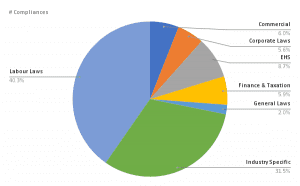Increasing adoption of digital compliance solutions by pharma companies
Rishi Agrawal, CEO and Co-founder, TeamLease Regtech, explains the importance of consolidated, data-driven and real-time compliance systems for a better future of pharmaceutical companies
The deep strength of India’s pharmaceutical sector has been one of the saving graces of the devastating COVID-19 pandemic. While the global economy has suffered and many sectors have taken a hit due to supply chain disruptions, India has been among the leading providers of health-related public goods in the world – be it vaccines, PPE or generic drugs. Based on recent studies, India’s pharmaceutical sector is characterised by a towering global presence, supplying nearly 60 per cent of the global demand for vaccines, 40 per cent of the generic drug demand in the US and 25 per cent of all medicines in the UK. According to the Reserve Bank of India, the pharma sector contributes around two per cent to India’s GDP, approximately eight per cent to the total merchandise exports.
Despite its success, the industry navigates a maze of complex regulatory structure. MSMEs bear a disproportionate brunt as they deal with the rigour of external regulators such as the US FDA for their exports, as well as a host of central and state compliances domestically. Setting up a single manufacturing facility in a single Indian state requires compliances at the setting up, pre-commissioning, post-commissioning and post-production stages. These are typically required one-time with ongoing compliances forming a whole other category. Typically, one-time compliances are registrations, consent orders, approvals, licences and No Objection Certificates (NOCs) to be obtained for the purpose of incorporation, health and safety of the workers, construction, land allotment, project-related approvals, tax-related registrations and electricity approvals, among others. Typically, setting up a single manufacturing facility can require more than 70 different licences and registrations.
Once manufacturing has been set, there are ongoing compliances with respect to labour, environment, health and safety, finance and taxation, compliances under other commercial laws governing the use of boilers, BIS standards, trademarks and so on. All in all, a small unit in a single state can be subject to over 900 ongoing compliances at any given time.

These compliances typically relate to maintenance of registers, filings of periodic returns, upkeep of audit and accounts, managing key appointments, periodic inspections, time-based and event-based payments, display requirements and others.
| Nature of Compliance | Count of Nature of Compliance |
| Register & Records | 162 |
| Employee Safety & Welfare | 146 |
| Others | 119 |
| Display Requirement | 117 |
| Return Filing, Disclosure & Intimations | 101 |
| Certificate and License | 53 |
| Examination and Testing | 48 |
| Register and Records | 48 |
| Payments | 44 |
| Cleanliness | 33 |
| Audit and Accounts | 14 |
| Committees | 10 |
| Appointment | 9 |
| Inspection | 7 |
| Meeting | 2 |
| Grand Total | 913 |
Source: Teamlease Regtech data for compliances in a single state
As the company expands its geographical footprint and sets up additional plants across other states, the number of compliances increase exponentially. For a pharma company with manufacturing units across five states, its compliances can easily go above 5,000 per year. Such a company will typically deal with over 1,000 annual regulatory changes across the law of the land. In the absence of integrated digital platforms, companies can easily miss relevant and critical regulatory updates. As a result, ad-hoc, manual, paper-based and people-dependent compliance programmes fail to scale. Cost of poor compliance and missed compliance has gone up. At least 40 per cent of the compliances have provisions for imprisonment.
Compliance management in India is complex. Poor compliance has become expensive. It affects a company’s reputation on governance, and, hence, has an adverse impact on the cost of capital and growth. Pharma sector has a high export orientation and is exposed to several international country-specific regulations as well over and above domestic compliance obligations. Effective compliance management is a hygiene factor to stay competitive. There is an urgent need for pharma companies to adopt and embrace digital, predictable and process-based compliance. State-of-the-art integrated web and mobile platforms equipped with smart workflows, integrated document management systems, integrated compliance database, timely regulatory updates, alerting engine, analytics and reporting engine can mitigate the risk. Consolidated, data-driven and real-time compliance systems are the future of pharmaceutical companies looking to both retain and expand their market share and staying on top of their competitors while remaining true to their consumers.


